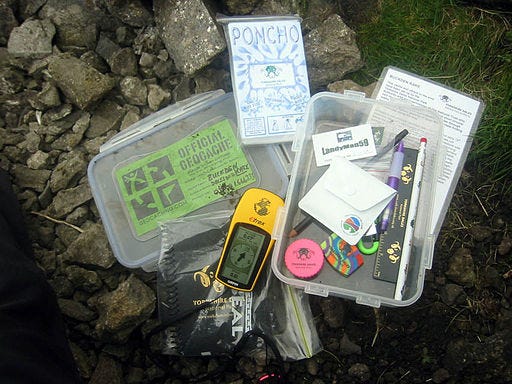Treasure hunt
Today’s guest post is from Ed Jefferson, writer and internet thing maker, and former regular contributor to CityMetric. This week: Bus stop scrabble, and a not-quite complete history of finding things
An Incomplete History Of Finding Things
Image: Geocache with GPS navigator. Wikipedia Creative Commons/Michalowic
2005
One afternoon, in the middle of a leafy square in London’s Central London, I rooted around in some bushes near a statue of Mahatma Gandhi until, eventually, I discovered what I was looking for: a tupperware box containing a small notepad in which was written a list of names and dates. Was this a list of spies to be eliminated? The people I must take revenge on in order to clear my ancestor’s name? A piece of viral marketing for a Dan Brown novel? No, no and (probably?) no. It was a geocache.
2000
On the 3rd of May, Dave Ulmer filled a black plastic bucket with a log book and an assortment of items (including food, software, money and a slingshot) and buried it at the side of a country road on the outskirts of Oregon City, near Portland. He noted the coordinates on a handheld GPS unit, then went online and posted them to the newsgroup sci.geo.satellite-nav, inviting people to find it and then: “Take some stuff, leave some stuff! Record it all in the log book. Have Fun!”
Just three days earlier this would have been a slightly pointless activity as it would have almost certainly been impossible to find. Though consumer GPS units had been available since the 1980s, until the 1st of May 2000 the US military used a feature called “Selective Availability” to randomly introduce errors of up to 100 metres into GPS signals, because they had no way to prevent anyone from buying a GPS device and, for example, turning it into a weapons targeting system.
Under pressure from various groups, including other parts of the US government who pointed out that knowing where stuff actually was instead of just where-it-sort-of-was might be nice, the military figured out alternative ways to make GPS less useful for the ‘bad guys’, and removed the errors from the signal. Suddenly anyone with a GPS unit could accurately track a bucket full of tat to within about 15 metres, and so began the Global Positioning Stash Hunt, as Ulmer initially named it.
The name didn’t stick – a month later another post appeared on sci.geo.satellite-nav, titled “Geocache, a new word for your dictionary !”, explaining that the ‘sport’ of finding hidden stuff using GPS was now called geocaching – the geocache being the thing you were trying to find. And it took off, sort of. Though it would be a push to call it mainstream, there are apparently at least 3m geocaches hidden around the world and, at least, a few million people trying to find them. Which makes sense, because people were doing this sort of thing long before GPS...
1854
James Perrott of Chagford, Devon, could provide you with one of three things. He rented out horses, he sold fishing tackle, and he gave guided tours of Dartmoor (Charles Dickens went on one, according to local legend). At some point in 1854 he walked to a site known as Cranmere Pool, built a small cairn, and placed a bottle on top of it. Visitors who reached said cairn were invited to leave a note in the bottle as proof that they had done so.
This evolved into the letterboxes of Dartmoor – to this day there are thousands of weatherproof containers in remote locations on the moor which are hunted based on map references and cryptic clues. Typically these contain a log book to record a find and a rubber stamp which can be used to create proof you can take away with you, in case for some reason you were tempted to go around lying to people about how many plastic boxes you’ve found on Dartmoor. Those who can prove they’ve found 100 of them can apply for membership of the elite Letterbox 100 club, and you can also apply for membership on behalf of a dog who qualifies. Woof.
Keep reading with a 7-day free trial
Subscribe to The Newsletter of (Not Quite) Everything to keep reading this post and get 7 days of free access to the full post archives.

